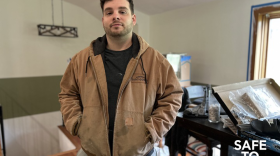A new study, commissioned by advocates in New Hampshire, shows that most firefighters’ protective gear is treated extensively with toxic PFAS chemicals.
Scientists at the University of Notre Dame picked up the issue, with funding from the National Science Foundation and the firefighter-focused Last Call Foundation, after a request by a Granite State couple.
Diane Cotter lives in Rindge with her husband, a longtime firefighter who was diagnosed with cancer in 2014. They had worried for years that PFAS was part of firefighters' turnout gear.
The chemicals are also known to be common in firefighting foam and have been found in water supplies throughout New Hampshire and are linked to health problems – including, potentially, cancer.
The new study is the first of its kind and says the chemicals can transfer to firefighters’ bodies by touch or just through wearing the gear, especially after it’s heated up. The study’s authors and advocates like Diane Cotter say the issue warrants more study.
“The fantastic aspect of the study is that it should have been commissioned by our institutions. Not a firewife,” Cotter says.
She’s also lobbied U.S. Sen. Jeanne Shaheen on the issue. Shaheen is backing a bill that will fund more analysis of PFAS in turnout gear, and set up a grant program to develop safe alternatives to the chemicals.
Cotter had also pushed for firefighters to be included in the first national PFAS health study, now being piloted on the Seacoast. Federal researchers say that study had to exclude people exposed on the job in order to assess PFAS risks to everyday citizens.








